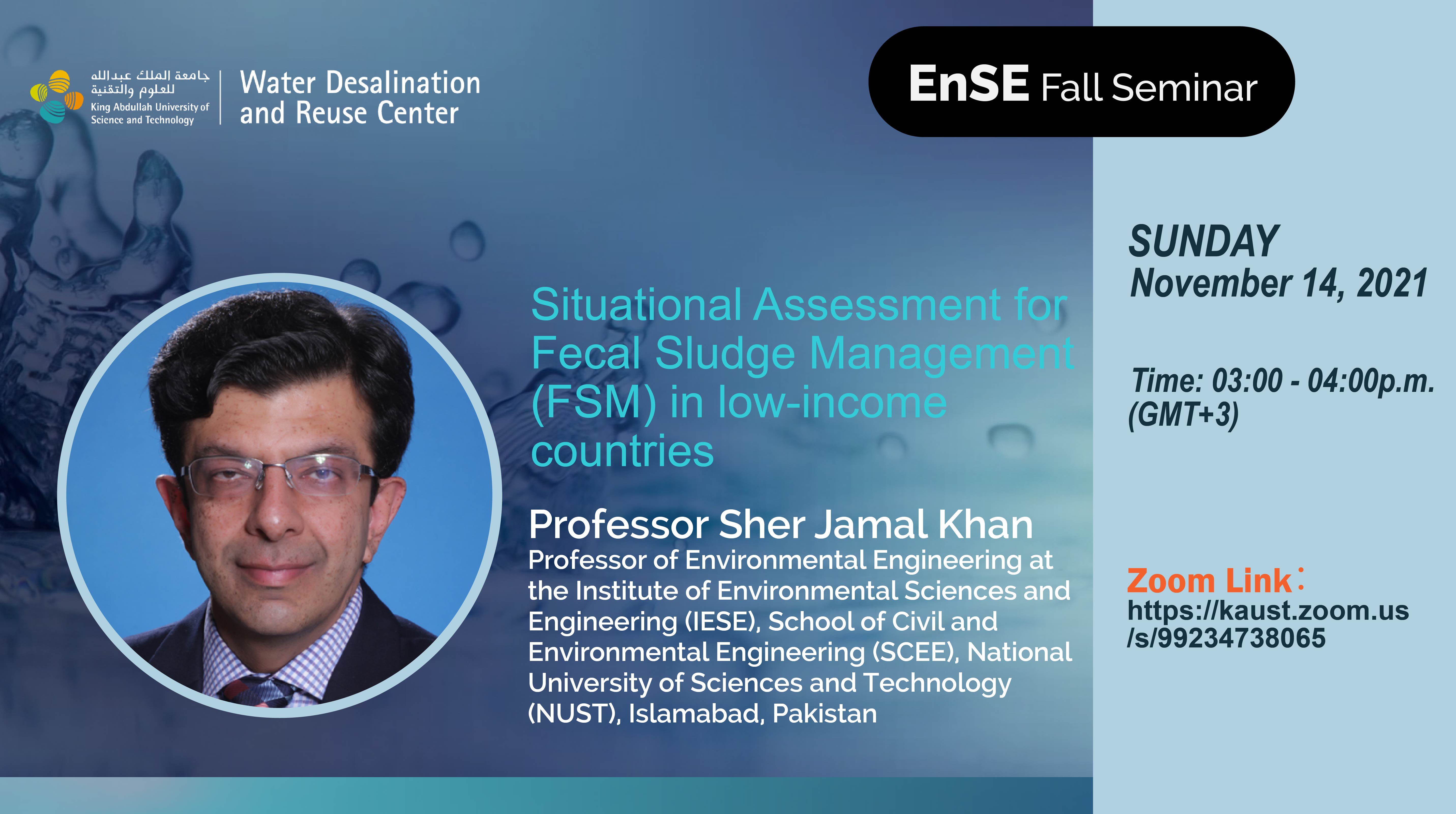
EnSE Seminar Series: Professor Sher Jamal Khan
When: Sunday November 14, 2021 | 3:00 - 4:00 p.m. (GMT +3)
Situational Assessment for Fecal Sludge Management (FSM) in low-income countries
Abstract:
With enhanced focus on global sanitation, access to toilets at households’ level is increasing in low middle-income countries although the provision of sewer networks is not expanding at the same pace. This is resulting in the underground containment of fecal waste in unstandardized On-Site Sanitation (OSS) facilities. The fecal sludge generated by the OSS facilities requires emptying, treatment, and safe disposal. This is the first study conducted to evaluate the sanitation situation and need for Fecal Sludge Management (FSM) in major cities of Pakistan including Islamabad Capital Territory (ICT), Lahore (provincial capital), and Karachi (provincial capital). Primary and secondary data were collected from key informant interviews (KII) of the stakeholders, national and international reports, research, and review articles. Infographics on wastewater and fecal sludge from origin to disposal were developed using a Shit flow diagram (SFD) and enabling environment was evaluated with a modified Service Delivery Assessment (SDA). The results indicate that adequate sewerage network cover exists in Karachi (96%), Lahore (95%), and ICT (50%), however, delivery to treatment plant and treated wastewater is sparse. In Karachi, only 10% of the wastewater gets treated while 90% is an environmental hazard. ICT treats 9% of its received wastewater and 25% of the on-site contained fecal sludge is safely buried while Lahore has no operational wastewater treatment plant currently thus, 100% of its wastewater and fecal sludge is unsafely managed. In Pakistan, the absence of framework and policy related to FSM interventions is seemingly making the national sanitation goal unachievable.
Bio:
Dr. Sher Jamal Khan is a professor of Environmental Engineering at the Institute of Environmental Sciences and Engineering (IESE), School of Civil and Environmental Engineering (SCEE), National University of Sciences and Technology (NUST) in Islamabad, Pakistan. His research interests are membrane-based water treatment, membrane bioreactor for wastewater treatment and hybrid biological systems for wastewater reclamation and reuse, decentralized wastewater treatment, and fecal sludge management. Since 2008, he has developed, operated and maintained laboratory-scale, pilot scale and full-scale membrane and biological based water and wastewater treatment systems while supervising 40 MS and 3 Ph.D. students’ research. Based upon his outstanding research work, he has published 64 research articles in peer reviewed international journals with cumulative impact factor (IF) of 200. So far, his research work has been cited 1200 times with h-index of 20. He has also published 4 book chapters internationally and attended 27 international conferences of repute. Dr. Sher Jamal Khan has received 14 research grants worth Rs. 544 Million (US$ 3.2 Million) from national and international funding agencies and organizations. Dr. Sher Jamal has successfully collaborated with international universities of repute in the UK, Germany, France, South Korea, Australia, Thailand, and Singapore. Lastly, Dr. Sher Jamal is considered an asset to the university (NUST) as well as Pakistan based upon his dedicated and hard work in the area of water technologies in order to secure clean and safe environment. His research achievements have been recognized with prestigious research awards nationally and internationally.
-copy.tmb-th1050x650.jpg?Culture=en&sfvrsn=1151a03a_1)
